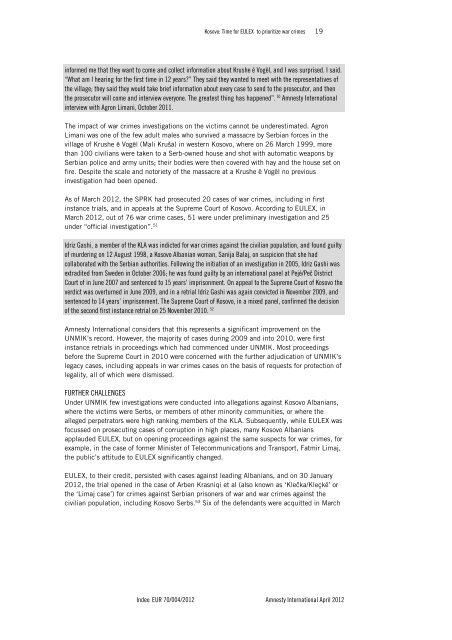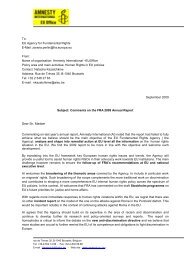Time for eULeX To prioriTize war crimes - Amnesty International ...
Time for eULeX To prioriTize war crimes - Amnesty International ...
Time for eULeX To prioriTize war crimes - Amnesty International ...
Create successful ePaper yourself
Turn your PDF publications into a flip-book with our unique Google optimized e-Paper software.
Kosovo: <strong>Time</strong> <strong>for</strong> EULEX to prioritize <strong>war</strong> <strong>crimes</strong> 19<br />
in<strong>for</strong>med me that they want to come and collect in<strong>for</strong>mation about Krushe ë Vogël, and I was surprised. I said.<br />
“What am I hearing <strong>for</strong> the first time in 12 years?” They said they wanted to meet with the representatives of<br />
the village; they said they would take brief in<strong>for</strong>mation about every case to send to the prosecutor, and then<br />
the prosecutor will come and interview everyone. The greatest thing has happened”. 50 <strong>Amnesty</strong> <strong>International</strong><br />
interview with Agron Limani, October 2011.<br />
The impact of <strong>war</strong> <strong>crimes</strong> investigations on the victims cannot be underestimated. Agron<br />
Limani was one of the few adult males who survived a massacre by Serbian <strong>for</strong>ces in the<br />
village of Krushe ë Vogël (Mali Kruša) in western Kosovo, where on 26 March 1999, more<br />
than 100 civilians were taken to a Serb-owned house and shot with automatic weapons by<br />
Serbian police and army units; their bodies were then covered with hay and the house set on<br />
fire. Despite the scale and notoriety of the massacre at a Krushe ë Vogël no previous<br />
investigation had been opened.<br />
As of March 2012, the SPRK had prosecuted 20 cases of <strong>war</strong> <strong>crimes</strong>, including in first<br />
instance trials, and in appeals at the Supreme Court of Kosovo. According to EULEX, in<br />
March 2012, out of 76 <strong>war</strong> crime cases, 51 were under preliminary investigation and 25<br />
under “official investigation”. 51<br />
Idriz Gashi, a member of the KLA was indicted <strong>for</strong> <strong>war</strong> <strong>crimes</strong> against the civilian population, and found guilty<br />
of murdering on 12 August 1998, a Kosovo Albanian woman, Sanija Balaj, on suspicion that she had<br />
collaborated with the Serbian authorities. Following the initiation of an investigation in 2005, Idriz Gashi was<br />
extradited from Sweden in October 2006; he was found guilty by an international panel at Pejé/Peč District<br />
Court of in June 2007 and sentenced to 15 years’ imprisonment. On appeal to the Supreme Court of Kosovo the<br />
verdict was overturned in June 2009, and in a retrial Idriz Gashi was again convicted in November 2009, and<br />
sentenced to 14 years’ imprisonment. The Supreme Court of Kosovo, in a mixed panel, confirmed the decision<br />
of the second first instance retrial on 25 November 2010. 52<br />
<strong>Amnesty</strong> <strong>International</strong> considers that this represents a significant improvement on the<br />
UNMIK’s record. However, the majority of cases during 2009 and into 2010, were first<br />
instance retrials in proceedings which had commenced under UNMIK. Most proceedings<br />
be<strong>for</strong>e the Supreme Court in 2010 were concerned with the further adjudication of UNMIK’s<br />
legacy cases, including appeals in <strong>war</strong> <strong>crimes</strong> cases on the basis of requests <strong>for</strong> protection of<br />
legality, all of which were dismissed.<br />
FURTHER CHALLENGES<br />
Under UNMIK few investigations were conducted into allegations against Kosovo Albanians,<br />
where the victims were Serbs, or members of other minority communities, or where the<br />
alleged perpetrators were high ranking members of the KLA. Subsequently, while EULEX was<br />
focussed on prosecuting cases of corruption in high places, many Kosovo Albanians<br />
applauded EULEX, but on opening proceedings against the same suspects <strong>for</strong> <strong>war</strong> <strong>crimes</strong>, <strong>for</strong><br />
example, in the case of <strong>for</strong>mer Minister of Telecommunications and Transport, Fatmir Limaj,<br />
the public’s attitude to EULEX significantly changed.<br />
EULEX, to their credit, persisted with cases against leading Albanians, and on 30 January<br />
2012, the trial opened in the case of Arben Krasniqi et al (also known as ‘Klečka/Kleçkë’ or<br />
the ‘Limaj case’) <strong>for</strong> <strong>crimes</strong> against Serbian prisoners of <strong>war</strong> and <strong>war</strong> <strong>crimes</strong> against the<br />
civilian population, including Kosovo Serbs. 53 Six of the defendants were acquitted in March<br />
Index: EUR 70/004/2012 <strong>Amnesty</strong> <strong>International</strong> April 2012



